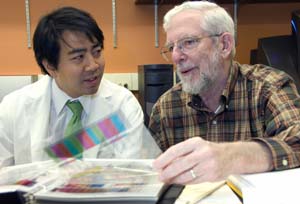Providing quality health care in the United States and abroad is such a priority to Franklin Huang, Ph.D., that he has spent nearly the past decade preparing for it.
After receiving a degree in medicine this week, Huang is heading to Boston to begin an internal medicine residency at Massachusetts General Hospital. After completing his residency, Huang says he wants a career combining science and medicine that allows him to work in developing countries.

“Using science to help people both here and in the developing world is really important to me,” he says. “I’d like to figure out an innovative way to provide low-cost, high-quality health care both here and abroad.”
It’s so compelling that in the five weeks before Commencement, Huang went to Bhutan, a mountainous country between China and India, to study how to manage chronic disease in the developing world in a low-cost, high-quality manner.
After the St. Louis native earned a bachelor’s degree in biology from Harvard University, he began a graduate degree there while deciding between a career in science or medicine. He chose both.
He completed one year of doctoral work at Harvard, came to the School of Medicine for his first two years of medical school, returned to Harvard to complete his doctorate and then returned to WUSTL to complete his medical degree.
In his last two years, Huang was part of the medical school’s Medical Scientist Training Program (MSTP), although he had already completed his doctorate.
“We decided to take the unprecedented step of offering Franklin MSTP support,” says Brian Sullivan, administrative director. “Although he has taken a unique path, he has given every indication he will go on to a successful career as a physician-scientist.”
The son of biochemists who influenced his focus on medicine and science, Huang says he always has been interested in the origins of disease as well as wanting to contribute positively to society. As an undergraduate, he founded a student-led organization that arranged activities focusing on international health and development. As a graduate student, he participated in a group that sent used lab equipment in good condition from Harvard-affiliated labs to scientists in developing countries.
“At Harvard, I got to work with Paul Farmer (M.D., Ph.D., co-director of Harvard’s Infectious Disease and Social Change program) and Arthur Kleinman, (M.D., chairman of Harvard’s Anthropology in Medicine Department) who strongly influenced my thinking about medicine and health,” Huang says.
The two were so influential to Huang that he and another WUSTL medical student developed a student selective on social medicine during their first two years at the medical school with the Harvard scientists’ input.
|
School of Medicine |
“We created a syllabus, contacted faculty, asked Brad Stoner (M.D., Ph.D., associate professor of medicine) to sponsor the course and enlisted other faculty to teach the course with us,” Huang says. “We fashioned it as an ideal way for students to prepare for trips abroad and to discuss issues they’d face.”
At Harvard, Huang’s mentor was Nancy C. Andrews, M.D., Ph.D., who was then Harvard’s dean for Basic Sciences and Graduate Studies and is now dean of the Duke University School of Medicine. “Nancy was an ideal role model as a physician-scientist and very influential to me,” he says.
Also, while a medical student, Huang was involved with Students Teaching AIDS to Students, an HIV/AIDS curriculum taught by medical students to area middle-school students. As an outgrowth of that work, he and a fellow student went to the Caribbean island of Dominica to start an AIDS education program.
During his pediatric rotation at St. Louis Children’s Hospital, Huang showed great compassion to children and their parents, says Michael R. DeBaun, M.D., professor of pediatrics and of neurology.
“Franklin was hard working, extremely bright, very motivated and was able to integrate principles of medicine with the art of medicine quite adeptly as a medical student,” DeBaun says.
Huang also is skilled in music. While in Boston, he co-founded the band Holding Room, for which he was songwriter, lead singer and guitarist. The band still occasionally plays shows in the Boston area.